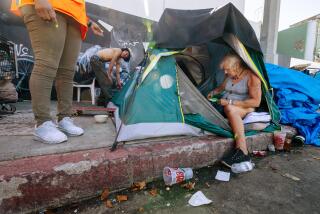Salt Lake City Mayor Bemoans State’s Gun Laws
- Share via
SALT LAKE CITY — Utah’s “extreme” gun laws could embarrass the state during the 2002 Winter Games, Salt Lake City Mayor Rocky Anderson fears.
But Olympic security officials appear ready to deal with the prospect of gun-toting spectators at the games in a state where about 30,000 people hold concealed weapon permits.
“It is a concern,” said Salt Lake City Police Chief Rick Dinse. “There is the potential to be a lot more weapons out there, but there are going to be a lot of police out there. We are going to have a lot of uniformed officers throughout the venue areas with the idea of keeping everybody safe.”
While Anderson praises the job the Utah Olympic Public Safety Command has done in planning for security threats, the gun issue worries him, he said.
“I think our extreme laws with respect to guns are unfortunate, especially when we’re putting on an event of this scope,” Anderson said.
Dinse said security planners have already taken armed citizens into account.
“There are areas where people are not going to get access to if they want to exercise their right to carry a weapon,” Dinse said. “We’re encouraging people to leave them at home.”
The Utah Legislature passed a law in 1999 banning weapons from designated Olympic venues. Metal detectors and police conducting bag searches will attempt to stop anyone who tries to bring a weapon into a venue, Dinse said.
However, criminals will find a way around gun control measures, said Sara Thompson of the Utah Gun Owners Alliance.
“People have nothing to fear from ordinary people with guns,” she said. “With law-abiding people, it doesn’t matter how many guns or what kind.”
The U.S. Attorney’s Office in Salt Lake City is trying to keep guns away from those who should not have them. A federal program aims to track down felons who illegally own weapons.
The program has resulted in more than 200 indictments in Utah during the past year, U.S. Attorney Paul M. Warner said.
“It’s not an antigun initiative, it’s an anti-criminal initiative,” Warner said. “We’re going to do everything in our power to clean up gun problems, particularly in Salt Lake City, prior to the Olympics.”
Warner has four prosecutors assigned to the gun program. He has asked the U.S. Department of Justice for two more before the games.
“We’re going to pursue this aggressively through the Olympics,” Warner said.
Another federal law enforcement official said state agencies are doing a good job of anticipating the threat posed by abundant guns.
“Utah should not be underestimated in [its] sophistication,” said Mark Camillo, Secret Service coordinator for the games. “My concern would be if it wasn’t being addressed.”
The Secret Service is the lead federal agency in Olympic security planning, but Camillo’s efforts focus on Olympic venues. Local police departments will be responsible for security threats outside the venues.
While downtown Olympic venues such as the medals plaza and Delta Center will be under tight security, Anderson laments that the City County Building and Utah Capitol were not afforded similar protection.
When it passed the measure prohibiting guns in Olympic venues, the Legislature didn’t include the state’s civic facilities.
A sticker on the door of the City County Building currently says “No Loaded Weapons.”
Anderson relates the story of a man who walked into the building with a pistol in his bag. Because the clip was out of the gun, security officers had no choice but to escort the man to the mayor’s office to conduct his business.
“It’s unsettling. I don’t think any employee should be subjected to that,” the mayor said.
Thompson said banning guns at City Hall would simply disarm the law-abiding while doing nothing to stop those who ignore the law anyway.
Utah has a reputation as a gun-toting place, but one Olympic security official said the threat of gun violence is not unique to the state.
“That’s not just a Utah issue; that’s a United States issue,” said David Tubbs, a former FBI agent who now is coordinator for the public safety command, a state agency.
“Japan and Australia don’t have weapons the way the United States does,” Tubbs said, referring to the 2000 Summer Games in Sydney and the 1998 Winter Games in Nagano.
A study commissioned by the gun control group Utahns Against Gun Violence found that 55% of the homes in Utah have at least one gun.
More to Read
Go beyond the scoreboard
Get the latest on L.A.'s teams in the daily Sports Report newsletter.
You may occasionally receive promotional content from the Los Angeles Times.






